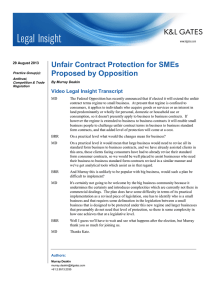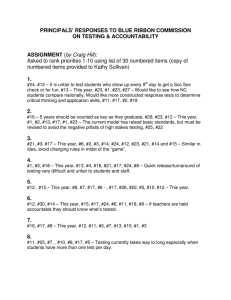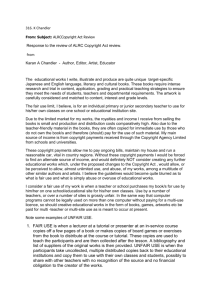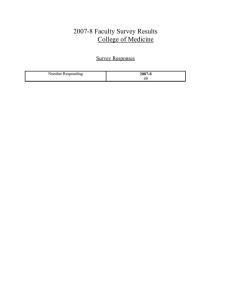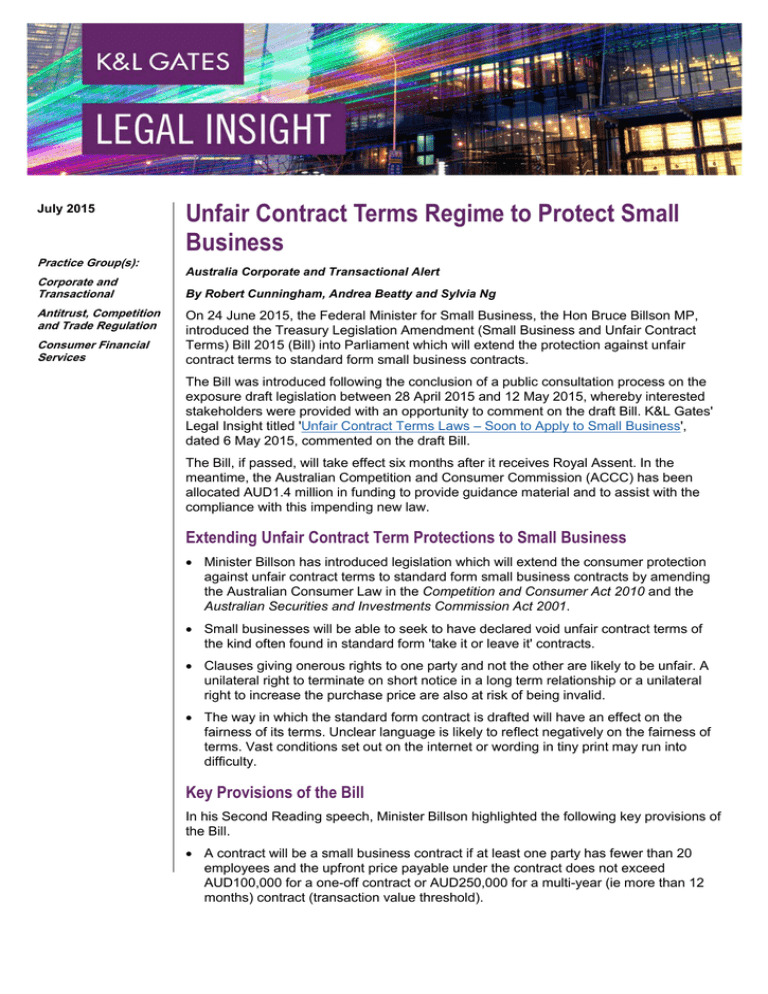
July 2015
Practice Group(s):
Corporate and
Transactional
Antitrust, Competition
and Trade Regulation
Consumer Financial
Services
Unfair Contract Terms Regime to Protect Small
Business
Australia Corporate and Transactional Alert
By Robert Cunningham, Andrea Beatty and Sylvia Ng
On 24 June 2015, the Federal Minister for Small Business, the Hon Bruce Billson MP,
introduced the Treasury Legislation Amendment (Small Business and Unfair Contract
Terms) Bill 2015 (Bill) into Parliament which will extend the protection against unfair
contract terms to standard form small business contracts.
The Bill was introduced following the conclusion of a public consultation process on the
exposure draft legislation between 28 April 2015 and 12 May 2015, whereby interested
stakeholders were provided with an opportunity to comment on the draft Bill. K&L Gates'
Legal Insight titled 'Unfair Contract Terms Laws – Soon to Apply to Small Business',
dated 6 May 2015, commented on the draft Bill.
The Bill, if passed, will take effect six months after it receives Royal Assent. In the
meantime, the Australian Competition and Consumer Commission (ACCC) has been
allocated AUD1.4 million in funding to provide guidance material and to assist with the
compliance with this impending new law.
Extending Unfair Contract Term Protections to Small Business
• Minister Billson has introduced legislation which will extend the consumer protection
against unfair contract terms to standard form small business contracts by amending
the Australian Consumer Law in the Competition and Consumer Act 2010 and the
Australian Securities and Investments Commission Act 2001.
• Small businesses will be able to seek to have declared void unfair contract terms of
the kind often found in standard form 'take it or leave it' contracts.
• Clauses giving onerous rights to one party and not the other are likely to be unfair. A
unilateral right to terminate on short notice in a long term relationship or a unilateral
right to increase the purchase price are also at risk of being invalid.
• The way in which the standard form contract is drafted will have an effect on the
fairness of its terms. Unclear language is likely to reflect negatively on the fairness of
terms. Vast conditions set out on the internet or wording in tiny print may run into
difficulty.
Key Provisions of the Bill
In his Second Reading speech, Minister Billson highlighted the following key provisions of
the Bill.
• A contract will be a small business contract if at least one party has fewer than 20
employees and the upfront price payable under the contract does not exceed
AUD100,000 for a one-off contract or AUD250,000 for a multi-year (ie more than 12
months) contract (transaction value threshold).
Unfair Contract Terms Regime to Protect Small Business
• To determine whether a business has fewer than 20 employees, a headcount
approach will be adopted (excluding casual employees not employed on a regular or
systemic basis) to simplify the application of the proposed new law.
• The transaction value threshold was selected as it has been determined that it is
reasonable to expect all businesses to conduct their own due diligence and seek
advice when engaging in large contracts.
• The Bill also allows exemptions to certain industry-specific laws or regulations which
provide protections for small businesses and which are equivalent to the unfair
contract terms regime.
Commencement
• The legislation will take effect six months after the Governor-General grants assent.
The government expects this to be in the first half of 2016. It remains to be seen how
the Senate will deal with the legislation and when the legislation will pass, if that is its
fate.
• The Bill is likely to gain enough support to pass in the Senate. For the time being,
businesses should anticipate its commencement in early 2016.
• Businesses that have standard form contracts which may fit the 'small business
contract' definition should make sure the contract is clearly drafted and does not
contain any unfair terms.
• Guidance will be available from the ACCC. Peak industry bodies will also provide
assistance to their members.
What Should you do?
Businesses should be aware that with the election promise to protect small business and
government funding given to the ACCC, the ACCC will actively monitor compliance once
the legislation comes into effect.
Accordingly, businesses who deal with small businesses should ensure they start
reviewing their standard form business contracts and put in place compliance procedures
particularly for future contracts or contracts approaching renewal after the legislation
commencement.
If you would like further information or assistance in this area, please contact us.
Authors:
Robert Cunningham
Andrea Beatty
Sylvia Ng
robert.cunningham@klgates.com
+61.7.3233.1214
andrea.beatty@klgates.com
+61.2.9513.2333
sylvia.ng@klgates.com
+61.2.9513.2303
2
Unfair Contract Terms Regime to Protect Small Business
Anchorage Austin Beijing Berlin Boston Brisbane Brussels Charleston Charlotte Chicago Dallas Doha Dubai Fort Worth Frankfurt
Harrisburg Hong Kong Houston London Los Angeles Melbourne Miami Milan Moscow Newark New York Orange County Palo Alto
Paris Perth Pittsburgh Portland Raleigh Research Triangle Park San Francisco São Paulo Seattle Seoul Shanghai Singapore
Spokane Sydney Taipei Tokyo Warsaw Washington, D.C. Wilmington
K&L Gates comprises more than 2,000 lawyers globally who practice in fully integrated offices located on five
continents. The firm represents leading multinational corporations, growth and middle-market companies,
capital markets participants and entrepreneurs in every major industry group as well as public sector entities,
educational institutions, philanthropic organizations and individuals. For more information about K&L Gates or
its locations, practices and registrations, visit www.klgates.com.
This publication is for informational purposes and does not contain or convey legal advice. The information herein should not be used or relied upon
in regard to any particular facts or circumstances without first consulting a lawyer.
© 2015 K&L Gates LLP. All Rights Reserved.
3

